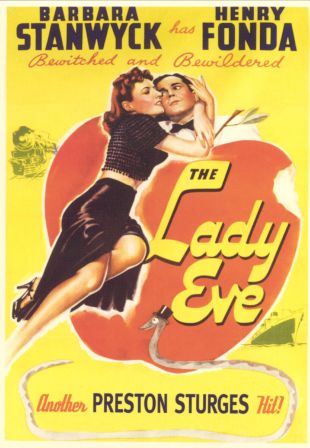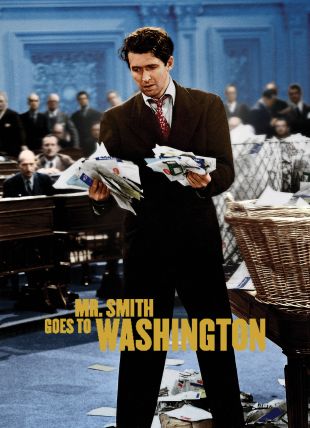It's a source of amazement to those filmgoers born after 1915 -- which is to say, most of us in the early 21st century -- that rotund, frog-voiced, barrel-shaped Eugene Pallette started out in movies as a rough-and-tumble stuntman and graduated to romantic leading man, all in his first five years in pictures. Indeed, Pallette led enough differing career phases and pursued enough activities outside of performing to have made himself a good subject for an adventure story or a screen bio, à la Diamond Jim Brady, except that nobody would have believed it. He was born into an acting family in Winfield, KS, in the summer of 1889; his parents were performing together in a stage production of East Lynne when he came into the world. He grew up on the road, moving from town to town and never really putting down roots until he entered a military academy to complete high school -- which he apparently never quite managed to do.
By his teens, Pallette, who was slender and athletic, was working as a jockey and had a winning record, too. Before long, he was part of a stage act involving riding, in a three-horse routine that proved extremely popular. He began acting on the stage as well, and was scraping out a living in the Midwest and West Coast, hoping to make it to New York. At one point, he was allowing a company manager in whose troupe he was working to pocket a major part of his earnings in anticipation of using the sum to finance a trip to New York, only to see the man abscond with the cash and leave him stranded.
Pallette turned to movies when he arrived in Los Angeles looking for stage work and found that there was nothing for him. He headed to a nearby studio, where he was told they were looking for riders and took a job as a stuntman for $1.50 a day. He quickly realized that there was a need -- and much more money offered -- for leading men, and he was able to put himself forward in that role. In a matter of a few days, Pallette had managed to make the jump from bit player to lead, and by 1914, he was working opposite the likes of Dorothy Gish. Such was his range that he was just as capable of playing convincingly menacing villains as romantic leads and dashing heroes. He was in D.W. Griffith's The Birth of a Nation in a small role as a wounded soldier. That same year, he played starring roles in three movies by director Tod Browning -- The Spell of the Poppy, The Story of a Story, and The Highbinders -- as, respectively, a drug-addicted pianist, a writer struggling with his conscience, and an abusive Chinese husband of a white woman. In Griffith's Intolerance, he had a much bigger heroic part in that movie's French sequences, while in Going Straight, also made in 1916, he gave a memorable performance as a sadistic villain.
Pallette's career was interrupted by the American entry into the First World War, for which he joined the flying corps and served stateside. When he returned to acting in 1919, he discovered that he had to restart his career virtually from square one -- a new generation of leading men had come along during his two years away. He'd also begun putting on weight while in uniform and, with his now bland-seeming features, found that only supporting parts were open to him -- and that's what he got, including an important role in Douglas Fairbanks' 1921 adaptation of The Three Musketeers. For a time, he even gave up acting, pulling his available funds together and heading to the oil fields of Texas, where he made what was then a substantial fortune -- 140,000 dollars in less than a year -- only to see it disappear in a single bad investment. Pallette spent an extended period in seclusion, hospitalized with what would now be diagnosed as severe depression, and then turned back to acting. He reestablished himself during the late silent era in character roles, built on his newly rotund physique and a persona that was just as good at being comical as menacing.
Pallette signed with Hal Roach Studios in 1927, where work as a comedy foil was plentiful, and his notable two-reel appearances included the role of the insurance man in the Laurel and Hardy classic The Battle of the Century that same year. It was with the advent of the talkies, however, that he truly came into his own; his croaky but distinctive, frog-like voice -- acquired from time spent as a streetcar conductor calling off stops to his passengers -- completed a picture that made him one of the movies' most memorable, beloved, and highly paid character actors and even a character lead at times. Paramount kept Pallette especially busy, and among his more notable movies were The Virginian, playing "Honey" Wiggin, and The Canary Murder Case and The Greene Murder Case in the studio's Philo Vance series, in which he portrayed Det. Sgt. Heath. He became especially good at portraying excitable wealthy men and belligerent officials.
Pallette was a veritable fixture in Hollywood for the next decade and a half, playing prominent roles in every kind of movie from sophisticated screwball comedies such as My Man Godfrey (1936) to the relatively low-brow (but equally funny) Abbott & Costello vehicle It Ain't Hay, with digressions into Preston Sturges' unique brand of comedy (The Lady Eve), fantasy (The Ghost Goes West), musicals (The Gang's All Here, in which he also got to sing as part of the finale), and swashbucklers (The Adventures of Robin Hood). The latter, in which he portrayed Friar Tuck to Errol Flynn's Robin Hood, is probably the movie for which he is best remembered. He was earning more than 2,500 dollars a week and indulged himself freely in his main offscreen hobby: gourmet cooking. He was unique among Hollywood's acting community for having free round-the-clock access to the kitchen of The Ambassador Hotel. Not surprisingly, Pallette's girth increased dramatically between the late '20s and the mid-'40s -- his weight rising to well over 300 pounds -- but it all meant more work and higher fees, right until the middle of the 1940s. He was diagnosed with what he referred to as a throat problem then, and gave up acting. By then, he had a ranch in Oregon where he and his wife lived. Pallette was also extremely pessimistic about the future of the human race, was on record as believing that some catastrophe would wipe us out, and reportedly had stockpiled food and water in a survivalist frame of mind. He died of throat cancer in the late summer of 1954, at age 65.
/_9by13/_derived_jpg_q90_310x470_m0/v%20%20%20%2021979.jpg)

